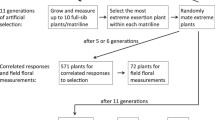Abstract
The nature of heterosis is discussed and selective elimination of alleles (introduced in the hybrid genotype by the parental forms) in anther culture is shown. This supports the possibility of removing viability-reducing alleles (lethal, semilethal, and less effective alleles) from the genotypes of heterotic hybrids in anther culture.
Similar content being viewed by others
References
Yuan, L.P., Future Outlook on Hybrid Rice Research and Development, Abstracts 4th International Symposium on Hybrid Rice, Hanoi (Vietnam) 2002, p. 3.
Bennett, J., Xuezhi, Bi, Kathiresan, I.A., et al., Molecular Tools for Achieving Synthetic Apomixes for Hybrid Rice, Abstracts 4th International Symposium on Hybrid Rice, Hanoi (Vietnam) 2002, p. 12.
Xiao, J.H., Li, J.M., Yuan, L.P., and Tanksley, S.D., Dominance Is the Major Genetic Basis of Heterosis in Rice as Revealed by QTL Analysis Using Molecular Markers, Genetics, 1995, vol. 140, pp. 745–754.
Yu, S.B., Li, J.X., Xu, C.G., et al., Importance of Epistasis as the Genetic Basis of Heterosis in an Elite Rice Hybrid, Proc. Natl Acad. Sci. USA, 1997, vol. 94, pp. 9226–9231.
Zhao, M.F., Li, X.H., Yang, J.B., et al., Relationship between Molecular Marker Heterozygosity and Hybrid Performance in Intra- and Inter-Subspecific Crosses of Rice, Plant Breed., 1999, vol. 118, pp. 139–144.
Hua, J.P., Xing, Y.Z., Xu, C.O., et al., Genetic Dissection of an Elite Rice Hybrid Revealed That Heterozygotes Are Not Always Advantageous for Performance, Genetics, 2002, vol. 162, pp. 1885–1895.
Strunnikov, V.A. and Strunnikova, L.V., The Nature of Heterosis and Methods of Enhancing and Fixing It in a Series of Generations without Hybridization, Izv. Akad. Nauk, Ser. Biol., 2000, no. 6, pp. 679–687.
Strunnikov, V.A., Priroda geterozisa i novye metody ego povysheniya (Nature of Heterosis and the New Methods of Its Enhancing), Moscow: Nauka, 1994.
Goncharova, Yu.K., Kharitonov, E.M., and Litvinova, E.V., The Nature of Heterotic Effect, Dokl. Ross. Akad. S-kh. Nauk, 2010, no. 4, pp. 10–12.
Goncharova, Y.K., Kharitonov, E.M., and Gronin, V.V., Removing of Half-Lethal Genes from Genotypes of Heterosis Hybrids Is a Method Which Will Give the Possibility to Raise Radically the Yield Potential of Crop, Proceedings of 3rd International Rice Congress and 28th International Rice Research Conference, Hanoi (Vietnam) 2009, p. 4110.
Goncharova, J.K., Creating Varieties by Fixing the Heterosis Effect in Rice Hybrids, in Accelerating Hybrid Rice Development, Los Banos: International Rice Research Institute, pp. 109–117.
Collard, B.C., Das, A., Virk, P.S., and Mackill, D.J., Evaluation of “Quick and Dirty” DNA Extraction Methods for Marker-Assisted Selection in Rice (Oryza sativa L.), Plant Breed., 2007, vol. 126, pp. 47–50.
Murray, M.G. and Thompson, W.F., Rapid Isolation of High Molecular Weight Plant DNA, Nucleic Acids Res., 1980, vol. 8, p. 4321.
Author information
Authors and Affiliations
Corresponding author
Additional information
Original Russian Text © Yu.K. Goncharova, 2013, published in Genetika, 2013, Vol. 49, No. 2, pp. 196–203.
Rights and permissions
About this article
Cite this article
Goncharova, Y.K. Selective elimination of alleles in rice anther cultures. Russ J Genet 49, 170–177 (2013). https://doi.org/10.1134/S102279541210002X
Received:
Published:
Issue Date:
DOI: https://doi.org/10.1134/S102279541210002X




